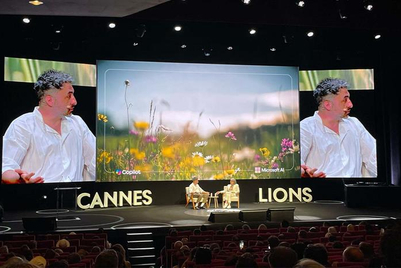.png&h=570&w=855&q=100&v=20250320&c=1)
The virtual audience at the ongoing Cannes Lions Festival of Creativity saw Annabel Murphy, editorial lead, Next – Euronews, in conversation with Madonna Badger, founder and chief creative officer, Badger & Winters. The duo spoke about the lines between provocative advertising and objectification, and how to get the balance right.
#WomenNotObjects campaign
The #WomenNotObjects campaign, also Badger’s brainchild, went viral overnight. Addressing how the campaign came to life, she said, “We were working on a whitening product for a Japanese client. They wanted it retouched beyond any human reality, and I’d done a lot of that before. However, that was the time when the light bulb went off for me, and I understood how wrong it was.”
Taking a deeper dive into some research, she found out how one of four girls from across the globe were on a diet by the age of 12. “Making people, especially women skinnier or whiter, has a detrimental effect on them. My partner – Jim Winters – and I made the promise to never objectify a woman again. We wanted to talk to creative directors around the world about the importance of not objectifying women.”
| See all our Cannes Lions 2021 coverage |
Speaking of how she made this possible, she said that Winters and she got up on stage at Cannes Lions and spoke to the creative directors about the importance of putting an end to objectification. “If men and others understood the harm they were creating, they would stop,” she added.
Badger stated that she displayed ads right from the 50s and the 60s to the 2000s, to help it realise for how long they were objectifying women.
Explaining the impact at the Cannes Lions, she said, “You can’t give an award to an agency that has put down another person’s race or religion. That same rule has now been applied to the idea of objectification.”
Distinguishing provocative art from objectification
The best way to know the difference, according to Badger, is through empathy. She believes that a woman’s sexuality is just as important as anyone else’s. “Understanding if the woman in the ad is in charge of her own narrative or is following the narrative of someone else’s story helps figure out the difference. It’s the idea of not being in control or being retouched beyond human recognition that qualifies as objectification.”
When asked about how people can identify this menace, she simply asks them to put themselves or their family members in the place of the person being objectified.
However, she clarifies that not just women, but boys, too, suffer from the repercussions of objectification. She said, “If young boys are introduced solely to sex via porn, they grow up with an unrealistic idea of sexuality and it becomes really hard for them to change out of that place of plastic."
Replacing sex in creativity
Badger hopes that the replacement of sex in creativity should not be a big problem. When Murphy put forth the point that women in power own their sexuality, but that it might not be the same case with the ones starting with their careers, Badger explained how women just have to be sure that their choices are worth the trouble they're taking.
"Some people might enjoy objectification in the bedroom, but that's different from advertising. The important thing is to realise that models, CEOs, CFOs are all women and that no one deserves to be portrayed in a demeaning light," she added.
She also shared how Dodge Ram, one of the brands featured in the #WomenNotObjects film (shown above), wrote back to them, stating that they only did it once for a swimsuit issue for Sports Illustrated, which wasn't a big deal.
Reason for being the change
When asked why she chose to be on the frontline of this cause, Badger stated that she wasn't a part of a holding company that could stop her. "I control the shares of my company. I saw the world of advertising change in front of my eyes and everything was purpose-driven. Ads must have a purpose. I wanted to make sure that we change the harm we're doing to women and children."
Speaking about the legacy she would want to leave behind, she said, "Change is made through communication and in the way we communicate. Everybody can make a change. There’s so much advertising out there that’s free for anybody to create or do. If you’re a communicator or a marketer and have something to say, then just say it."


.jpg&h=334&w=500&q=100&v=20250320&c=1)


.png&h=334&w=500&q=100&v=20250320&c=1)




.png&h=334&w=500&q=100&v=20250320&c=1)




.jpg&h=268&w=401&q=100&v=20250320&c=1)
.png&h=268&w=401&q=100&v=20250320&c=1)
.png&h=268&w=401&q=100&v=20250320&c=1)

